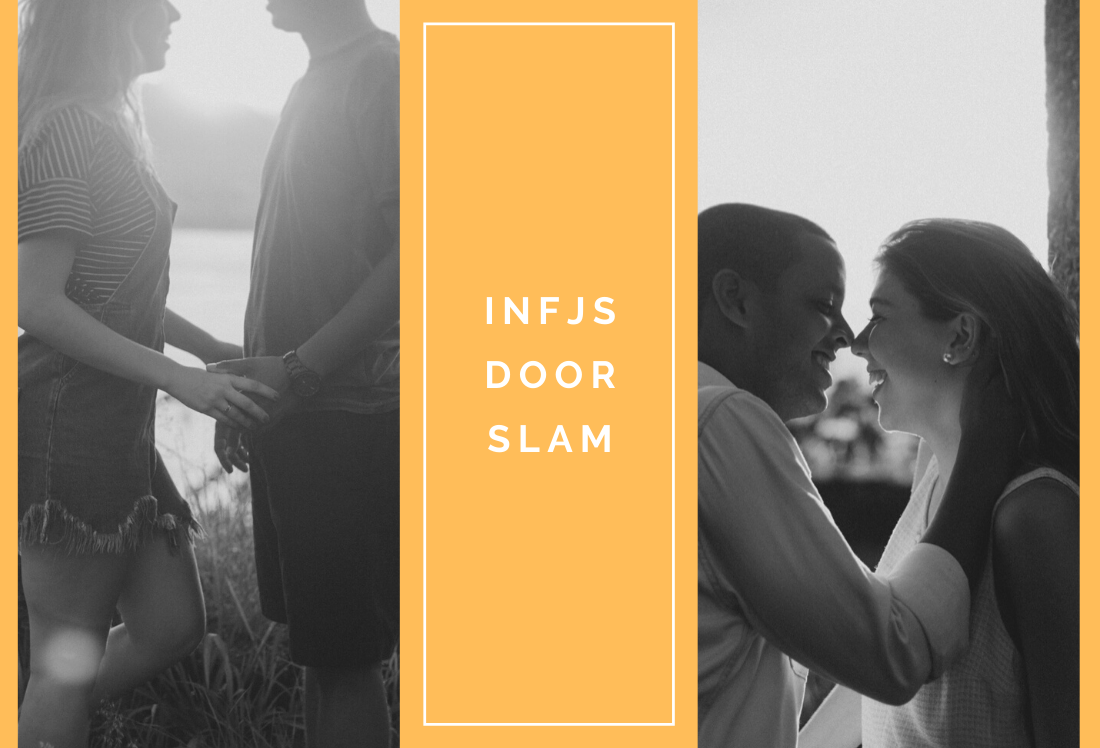One of the magnificent things about having a YouTube channel about INFJs is many non-INFJs message me asking questions about their beloved INFJs and about a potential doorslam. This really makes me ecstatic. I know how hard it can be for an INFJ, one of the introverted Myers-Briggs personality types, to be in a relationship, especially a romantic one. So, I take these questions as an opportunity to help my fellow INFJs find long-lasting love.
Time after time, INTJs, INFPs, ENFPs, and others ask me the same question about their particular INFJ. “I finally told the INFJ that I like her/him, and at first things seemed fine. But now, it seems like they are slowly pulling away from me. I’m not sure if they are no longer interested in me in that way, or if they are just taking time to evaluate their feelings.”
Fascinating stuff! Exactly because there’s no one answer to this question. Yes, the INFJ could be withdrawing from you because they realize they aren’t really interested in you in that way. They may want to remain friends. But are afraid to say those words out loud, in case they lose a relationship with you completely. In general, INFJs are not very good at confrontation. Or, any kind of difficult conversations where they know they will hurt the other person or let them down.
Alternatives?
Or that might not be it all. They could be taking time away from you to analyze exactly how they feel about you. Like many introverts, INFJs have a hard time processing their feelings when they are surrounded by other people. A lot of our mental processing happens in solitude.
Personally, I spend at least an hour or two every night before falling asleep analyzing, processing, and assimilating the lessons of the day. I need that time, otherwise I literally feel like too much is happening, causing me to be overwhelmed. That’s when I end up retreating into my introvert cave rather aggressively.
Which Kind of Withdrawal Is It? How Can I Know?
Even if INFJs are not good at expressing what’s going on in their hearts, they will probably not lie to you once asked a direct, serious question.
Therefore, I always tell my viewers to go big or go home. Ask the question that’s in your heart, directly to your beloved INFJ. “Are you interested in me romantically? Or are you not? Should we just remain friends, or do I have some hope in the future of being your partner?”
Something like that. In your own heartfelt words, of course.
Most INFJs love directness of this kind. As an INFJ, I wish all those people who told me years after the fact that they had a crush on me, had actually told me right away. I had no idea they liked me. And I wish they had told me so we could have had some chance of doing something about it.
If you are in the same boat… if you have an INFJ who’s confusing the heck out of you with their mixed signals, it’s time to put it all to an end by asking a few simple and direct questions.
As an INFJ, I’m usually more than happy to answer such questions. I would rather die than bring up such topics myself. But I am happy to oblige when someone else is braver than me and able to bring up such terrifying conversations without compunction. In fact, I will probably be giving you a mental high-five for being so awesome.
Who knows, your courage might light a spark in your INFJ’s heart — and this kind of courage is definitely a major turn-on for most INFJs.
INFJs Also Withdraw When They Have Been Hurt
Being hurt is another thing that causes INFJs to withdraw silently. If it’s a serious hurt, you may find yourself at the receiving end of something called the INFJ doorslam. Which is pretty much permanent. However, when the hurt isn’t as serious, it may become silent withdrawal. This can be reversed if something causes the INFJ to change their mind.
For example, my INTJ sister has a tendency to say hurtful things she doesn’t actually mean to be hurtful. She was just being blunt, but in my heart, I felt so much hurt that I needed to withdraw for a while to lick my wounds.
That time I take for myself is actually great for our relationship, because I can come back stronger, and healed. I can come back to her, and either honestly tell her that her words were cruel and painful, or that she’s right, and I need to do better.
Silent Withdrawal Or Doorslam
Thus, the silent withdrawal can also happen because your INFJ was intentionally or unintentionally hurt by something you said or did. Something I have noticed about myself is there are many random, crazy things that end up offending me. This is without me being fully conscious of it. I am trying to do better in this regard. But I have noticed that every INFJ has a laundry list of such offenses that cause them to clam up, withdraw, or pull away from the people in their lives.
If you think you have hurt or offended the INFJ, first, give them the time and space they need. Then the important thing is to poke and prod a bit to figure out exactly what it was that hurt them. This way, you will have knowledge for the next time, and you won’t repeat your mistake. Perhaps the two of you can talk about it. And the INFJ will see that you didn’t mean to hurt them — that it was just a misunderstanding.
Maybe having this conversation will work, but maybe it won’t. I have noticed in my own relationships that it works remarkably well when my partner can be direct, honest, and blunt with me. It teaches me about my weak spots. And teaches me to be less easily offended, which is something I have always struggled with, to be honest.
I know it’s not easy to be this direct with someone you really care about, whether you’re an introvert or an extrovert, an INFJ or not. Because INFJs experience so little honesty from the world, you will actually be elevating yourself in your INFJ’s eyes by being direct with them. No matter what your INFJ’s response, you will likely earn their respect.



